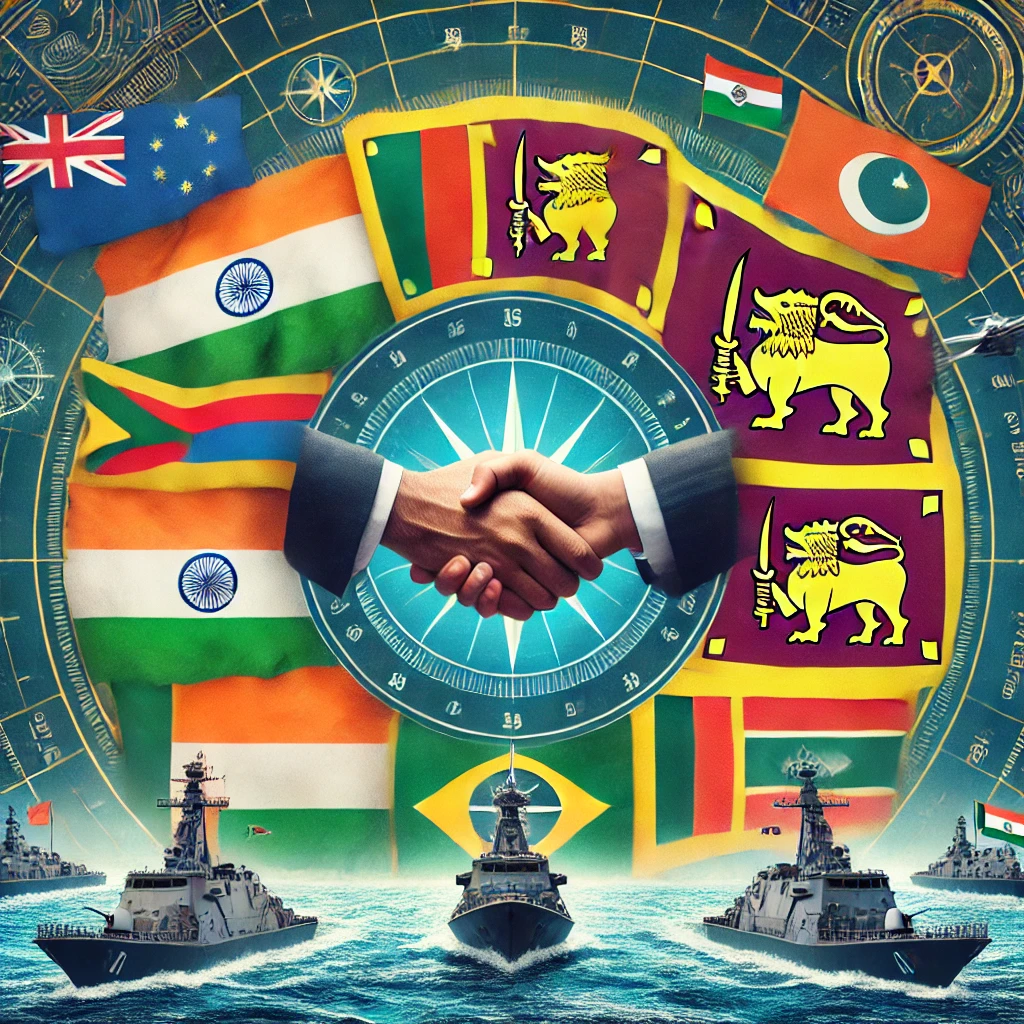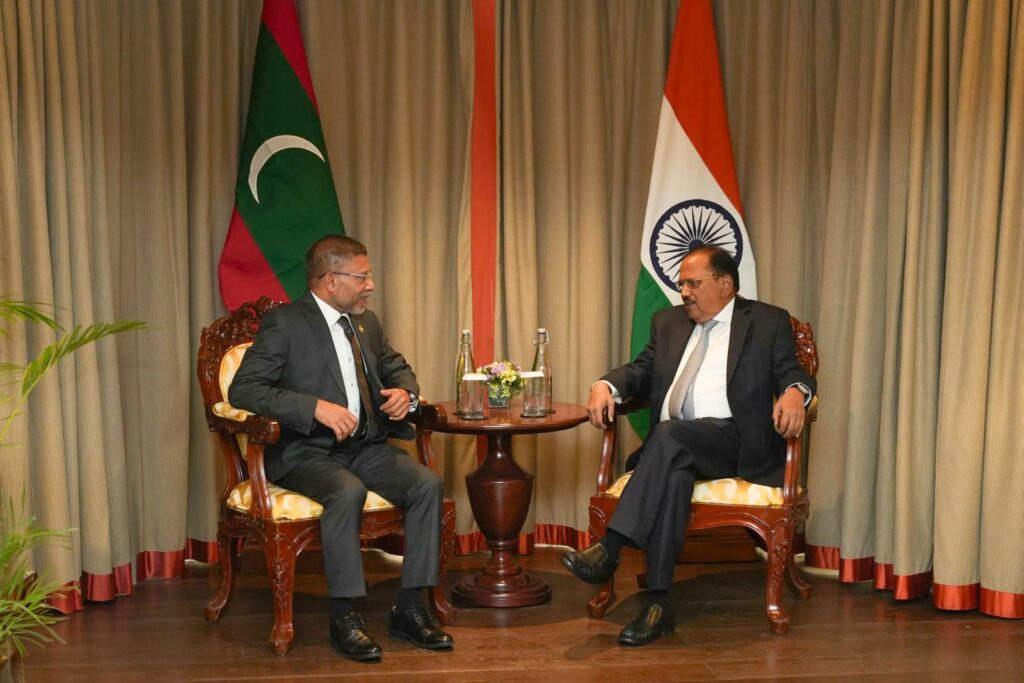
- Strategic Revival: The Colombo Security Conclave (CSC) was revived in 2020 by India to address the increasing strategic importance of the Indian Ocean and counter the growing influence of extra-regional powers like China.
- Core Pillars: The CSC focuses on five key areas of cooperation: maritime safety, counter-terrorism, combating trafficking, cyber-security, and humanitarian assistance, with India playing a leading role in shaping the regional security architecture.
- Challenges: The CSC faces challenges from domestic political changes in member states and the influence of China, which could impact the cohesion and effectiveness of the group in addressing regional security threats.
The Colombo Security Conclave (CSC) aims to promote a safe, secure, and stable Indian Ocean region, with India playing a leadership role. India’s National Security Adviser (NSA) recently participated in the 8th NSA meeting of the Colombo Security Conclave (CSC), a regional security grouping that agreed upon a strategic road map. The CSC has emerged as a vital platform for maritime security cooperation in the Indian Ocean, with India playing a leading role in shaping the regional security architecture. The conclave’s initiatives are becoming increasingly significant as the geopolitical dynamics in the Indian Ocean evolve, particularly in light of the rising influence of extra-regional powers like China.
On July 10, the eighth Deputy NSA-level meeting of the CSC took place virtually. India, Mauritius, the Maldives, and Sri Lanka welcomed Bangladesh as the fifth member state of the grouping set up to counter China’s growing influence in the Indian Ocean Region. Seychelles participated as an observer.
What is the Colombo Security Conclave?
The Colombo Security Conclave, originally known as the Trilateral for Maritime Security Cooperation, was established in 2011. The initiative was initially a trilateral maritime security collaboration between India, Sri Lanka, and the Maldives. In 2022, Mauritius joined the group, expanding its membership to four nations. The CSC aims to promote a safe, secure, and stable Indian Ocean, with a focus on collective maritime security and counter-terrorism efforts.
The expansion reflects the growing importance of the CSC in the region’s security framework. All CSC member countries are also part of broader Indian Ocean regional groupings, such as the Indian Ocean Rim Association (IORA) and the Indian Ocean Naval Symposium (IONS).
Five Pillars of Cooperation
The CSC’s collaborative efforts are built on five core pillars:
1. Maritime Safety and Security: Ensuring the safety of maritime routes and securing the Indian Ocean from threats such as piracy and illegal fishing.
2. Countering Terrorism and Radicalisation: Addressing the rising threats of terrorism and radicalisation, which have significant implications for regional security.
3. Combating Trafficking and Transnational Organised Crime: Targeting the networks involved in trafficking drugs, arms, and humans across the Indian Ocean region.
4. Cyber-Security and Protection of Critical Infrastructure: Enhancing the cyber resilience of member states and safeguarding critical infrastructure from cyber threats.
5. Humanitarian Assistance and Disaster Relief (HADR): Strengthening the ability to respond to natural disasters and humanitarian crises, which are common in the region.
In 2021, a permanent secretariat was established in Colombo to coordinate all activities and implement decisions made at the NSA level. The CSC meetings occur at the level of NSA and deputy NSA, ensuring high-level strategic discussions.
Significance of the CSC
Since its revival, the CSC has played a pivotal role in addressing various security concerns in the Indian Ocean region. The group has investigated issues such as terrorism and terror financing, narcotics trafficking, cybercrime, marine pollution, maritime law, and coastal security. In 2021, India, Sri Lanka, and the Maldives conducted Exercise Dosti XV in the Maldives and subsequently held their first joint exercise in the Arabian Sea, named the Table Top Exercise (TTX). These exercises underscore the CSC’s commitment to enhancing regional security.
The CSC has also been active in fostering collaboration through conferences. In 2022, the organisation held its first Conference of Oceanographers and Hydrographers and a Conference on Coastal Security, with the next iterations scheduled for 2024. Joint working groups have been established to focus on specific areas such as counter-terrorism, cyber-security, HADR, trafficking, and transnational organised crimes.
Changing Dynamics of the CSC

The CSC has undergone significant changes since its inception. Although it started in 2011, the initiative faced disruptions after 2014 due to rising tensions between India and the Maldives, leading to a suspension of meetings between 2014 and 2020. However, in 2020, India pushed for the revival of the CSC, rebranding it as the Colombo Security Conclave.
The revival of the CSC is driven by the increasing strategic importance of the Indian Ocean in a multipolar world, with extra-regional powers like China making inroads into the region. China’s growing presence in the Indian Ocean, particularly through its Belt and Road Initiative (BRI) projects and the establishment of a base in Djibouti, has heightened concerns among CSC member states. China’s control over Sri Lanka’s Hambantota port further underscores the need for a coordinated regional security approach.
For India, the CSC offers a platform to institutionalize its leadership role in the region, shaping the regional security architecture and addressing both existing and emerging threats. India has consistently acted as the first responder in the Indian Ocean Region (IOR), whether in averting coups or providing humanitarian and economic assistance during crises, such as the COVID-19 pandemic.
Challenges Faced by the CSC
Despite its significance, the CSC faces several challenges that could hinder its effectiveness. Domestic politics in member states remain a potential vulnerability. For instance, the Maldives’ absence from the recent CSC meeting highlights how internal political changes can impact participation.
Moreover, the influence of China poses a challenge to the CSC. While all member states are democracies, they may continue to balance nationalist and pro-China policies for domestic and external benefits, particularly as the Indo-Pacific region gains prominence. This balancing act could affect the cohesion and effectiveness of the CSC in addressing regional security challenges.
The convergence of six Indian Ocean region countries within the CSC also signals the emergence of sub-regionalism on a unified maritime and security platform. However, this sub-regionalism must navigate the complexities of broader geopolitical dynamics in the Indo-Pacific.
What Lies Ahead?
As the CSC moves forward, it must uphold a common strategic vision that emphasizes the importance of resisting escalating Chinese influence in the region. Fostering collaboration among member states and avoiding points of contention with neighbouring countries will be crucial to maintaining the CSC’s effectiveness.
The CSC’s future success will depend on its ability to adapt to changing regional dynamics, enhance cooperation among its members, and continue addressing the multifaceted security challenges in the Indian Ocean. By doing so, the CSC can reinforce India’s leadership role in the region and contribute to a more secure and stable Indian Ocean.
The Colombo Security Conclave represents a critical step in enhancing regional security cooperation in the Indian Ocean. With India playing a central role, the CSC has the potential to shape the future security architecture of the region. However, to achieve its objectives, the CSC must navigate domestic political challenges, manage external influences, and foster a unified approach among its member states. As the Indian Ocean continues to grow in strategic importance, the CSC’s role in ensuring a safe, secure, and stable region will only become more significant.
References:
- Cooke, George IH. “STRATEGIZING SRI LANKA’S FOREIGN POLICY: THE SCOPE OF AIR DIPLOMACY.” In Colombo Air Symposium, p. 23. 2018.
- Kim, Taekyoon, Sang Jun Lee, and Manjula Pradeep. “Strengthening Public-Private Partnership in Sri Lanka’s Infrastructure Development Project: The Colombo Port Case.” Asian International Studies Review 20, no. 1 (2019): 91-120.
- Das, Rup Narayan. “Fresh Impetus to India-Sri Lanka Ties.”
Prajwal K M holds a Master’s in Diplomacy, Law, and Business with a specialization in Economics and Foreign Policy. He is currently a consultant at the Nation First Policy Research Centre (NFPRC), a Delhi-based think tank working on policy design and implementation with the government. Formerly Deputy Editor at SamvadaWorld, his work focuses on the political and economic landscapes of West Asia and North Africa.
